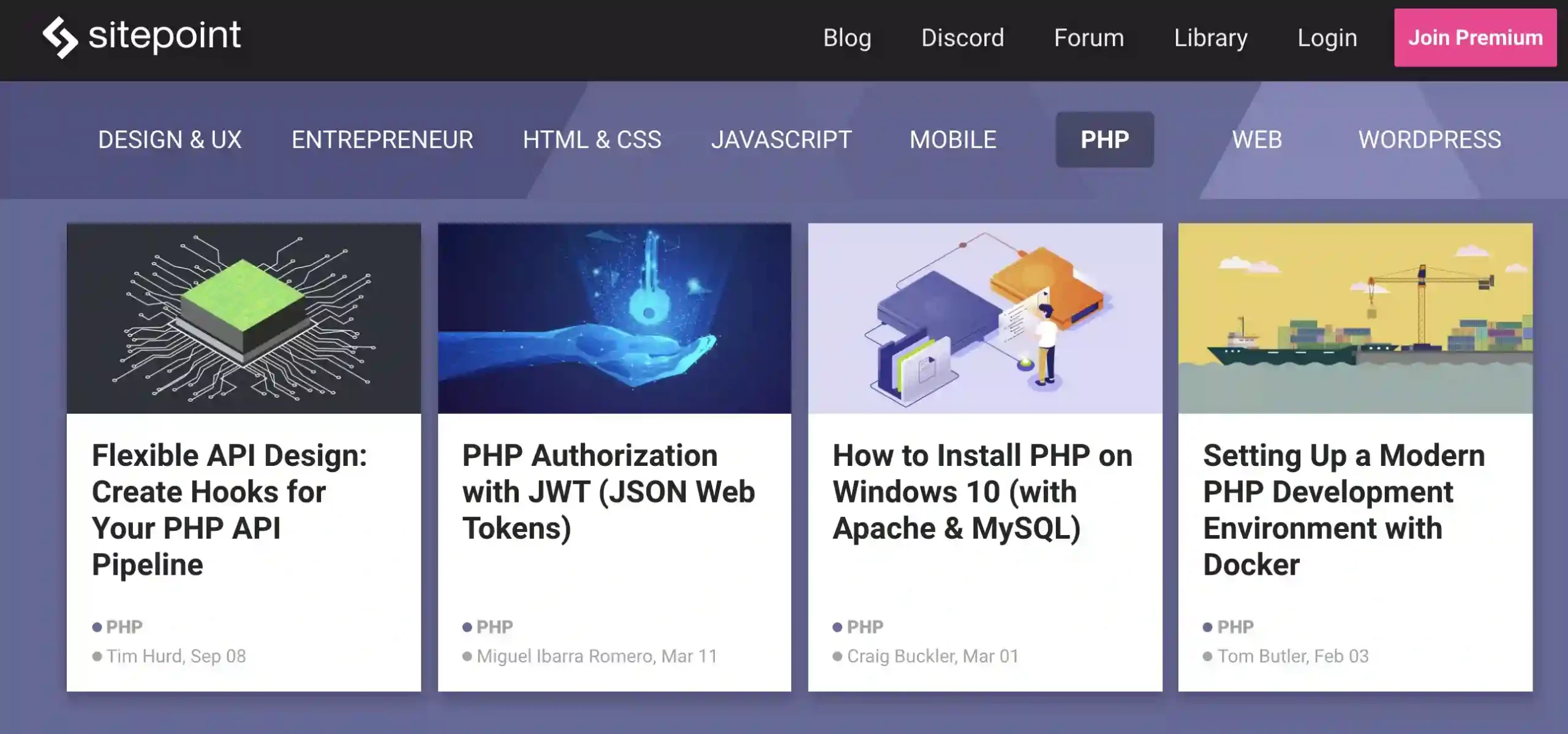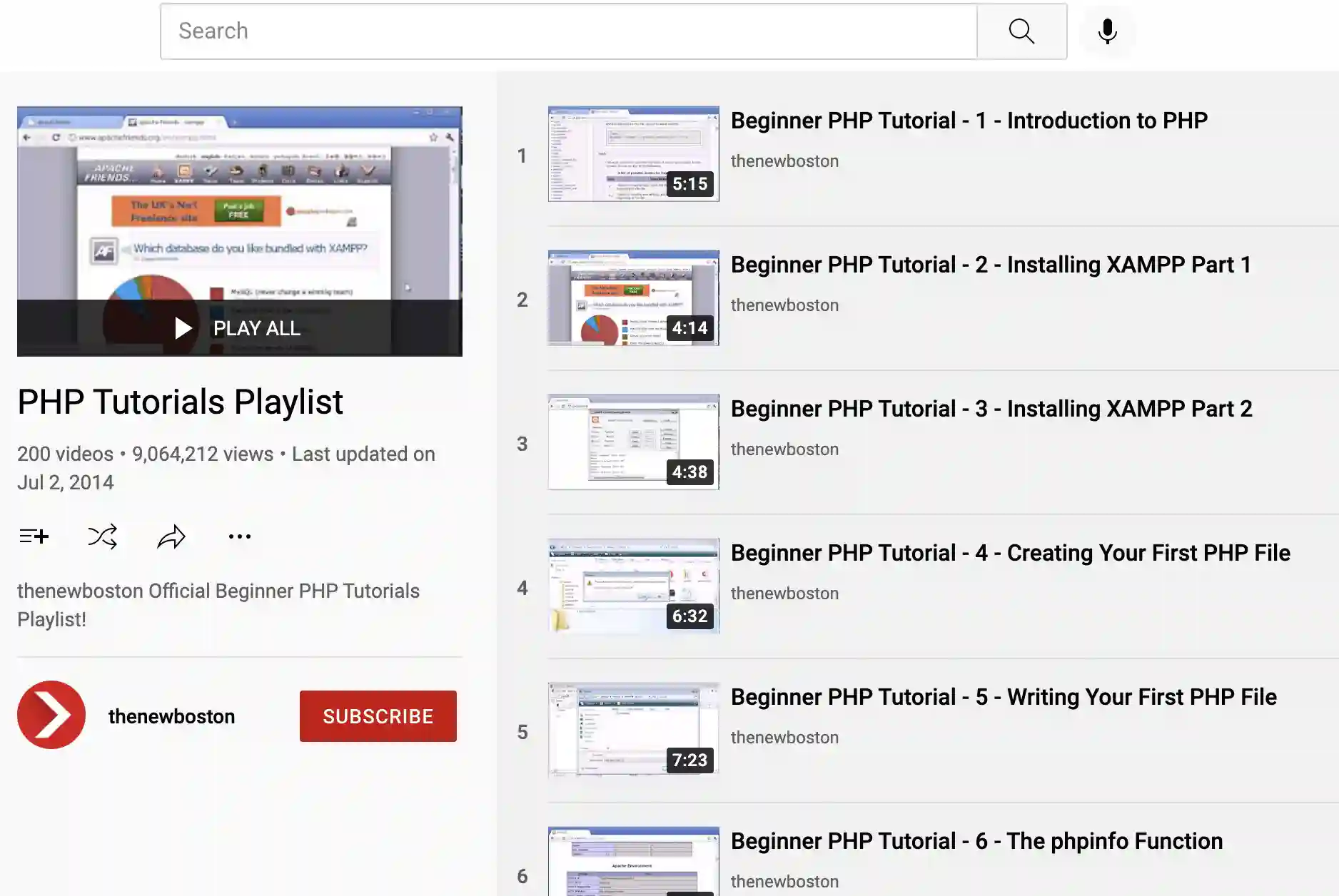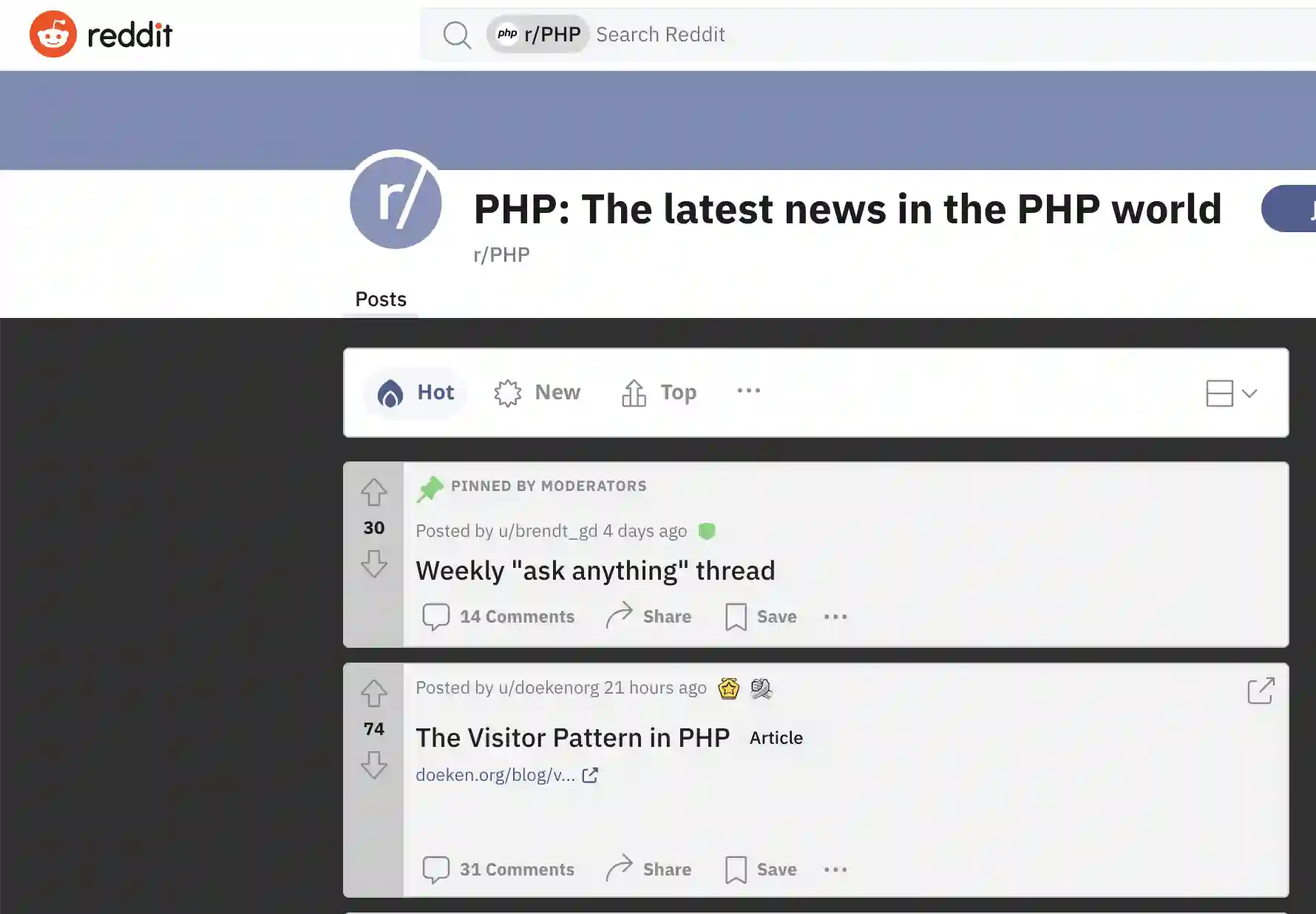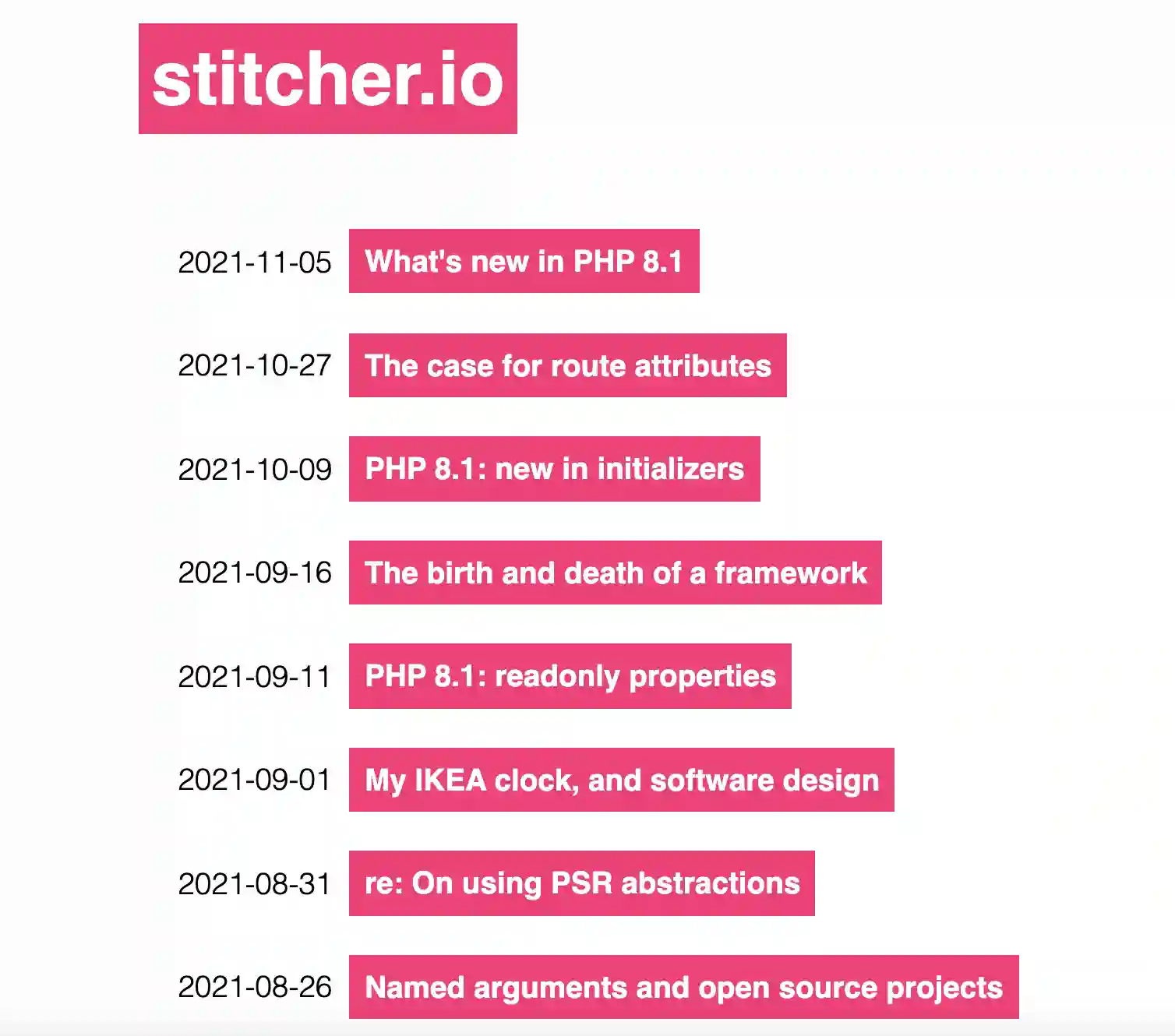PHP, which stands for Hypertext Preprocessor, is among the most intriguing programming languages.
More than 80 percent of the world’s websites use the server-side programming language. Because its environment is continually growing and improving, it has attracted much interest from experienced coders and developers.
PHP blogs abound on the internet, catering to both novices and more experienced coders who want to improve their knowledge of a computer program already in high demand in the business.
The language is translated rather than compiled, implying that it is performed at run-time rather than compile-time.
This eliminates the need for a lengthy compilation process, enabling you to view the results of any code changes immediately. Furthermore, it provides a quick feedback loop, enabling PHP to be one of the fastest programming languages to learn and master.
Listed below are a few of the most outstanding PHP channels on Youtube and PHP blogs currently available:
Best PHP Blogs – Our Top Pick👌👌
1. Killer PHP
Stefan Mischook is the author of the Killer PHP weblog, which he dedicated to teaching people how to program in the PHP programming language.
Because Mischook typically publishes one or two articles every month, the site places a premium on quality rather than quantity. Killer PHP teaches you the fundamentals of the PHP programming language using videos and articles tutorials.
These articles start from the very elementary, such as installing the PHP on your computer, then progress from there.
With Killer, you would be taught everything from writing your first PHP script to processing HTML forms and creating loops. Killer PHP has very comprehensive and engaging courses.
This blog gives you an accessible entrance into the PHP language and equips you with all you need as a beginner. Mischook, its founder, suggests starting with Python to understand PHP more quickly and effectively.
2. Code Tuts – Envato Tuts+
This is one of the PHP Blogs that distills the fundamentals of PHP programming down to its bare essence. Code Tuts – Envato Tuts+ is perfect for beginners.
It consists mainly of tutorials containing clearly-defined stages on achieving many activities working with the PHP language. While it teaches more than just PHP, users could search for strictly PHP content and have a go at them.
Users here will be taught how to send an email in PHP employing Swift mailers, about PHP coding standards, the authorization and authentication service provided by the language, and about why WordPress is built on the PHP programming language and framework.
3. SitePoint – PHP
SitePoint’s PHP blog remains one of the most frequently visited blogs based on the subject you will find everywhere.
The topics covered on this Australia-based site are APIs and frameworks inside the language; it also teaches development environment issues such as performance, security, performance, and scaling.
The topics covered on this Australia-based site are APIs and frameworks inside the language; it also teaches development environment issues such as performance, security, performance, and scaling.
It also has some transitional posts, which show you how to leverage background computing to allow faster page load speed, among other things.
4. Exakat
Exakat is a corporate blog that primarily promotes the firm’s product launches, with some PHP publications thrown in for good measure. The blog postings are exciting and technical; however, they are brief for the more complicated topics.
They know their PHP-based product inside and out but do not have credibility with other PHP topics.
Most of the blog’s postings are acceptable, while some have more punctuation and grammar issues than others, and the posts could benefit from more graphics and links.
The blog is updated regularly, sometimes biweekly, and other months with no posts.
5. Planet PHP
Content is plentiful on the Planet PHP site, with approximately four weekly entries covering the most recent PHP news, protocol updates, and framework developments.
The blog includes guest blogs from skilled programmers, including Rob Allen’s likes, and lessons on how Fractal may enhance your APIs.
6. PHP Jabbers
PHP Jabbers is a PHP merchandise website that offers free lessons, scripts, and materials. There are a few posts on the site, some commercial or promoted. The articles scrape the skin, and some programmers may be left wanting more.
While a product’s commercial blog, the aesthetics, particularly spelling and layout, could use some work.
The writing quality could easily be improved with some refinement and valuable connections. According to my research, new articles are only released a few times a year.
7. Ircmaxell
In addition to being one of the most amazing PHP blogs, Ircmaxell aims to enhance your coding experience by utilizing cutting-edge programming principles.
You will also learn about the most recent PHP and WordPress flaws and how site operators, web providers, and plugin developers may strengthen the security of their code even more effectively.
8. Matt Stauffer
Matt Stauffer’s website will train you on fundamental PHP ideas, including interacting with Google Spreadsheets using PHP, but it is mostly intended for more expert coders than beginners.
This site has a wealth of information, from setting console commands to developing custom comments for PHPUnit and keeping up with the latest improvements to the language’s caches.
9. PhpStorm Blog
In addition to providing you with (IDE) integrated development environment pieces on many themes, PhpStorm Blog is another excellent PHP blog to follow.
The blog discusses code completion, rename refactorings, a coding productivity mindset, and other valuable tools to assist you in honing your coding abilities and becoming more productive.
10. PHP Roundtable
Please make no mistake that PHP Roundtable has only 2,000+ members; the option is still in its early stages and is packed with important PHP information.
In keeping with the name, the program hosts roundtable conversations with various experts on the subject, lasting anywhere between 45 minutes to 75 minutes.
Extensive data on the PHP analysis method, a deep dive into the source code of PHP 7, and text encoding in PHP can all be found on this page.
11. JREAM
This JREAM channel is hosted by Jesse Boyer, a skilled web developer who discusses various subjects from WordPress to Python to PHP.
He is a multi-talented jack-of-all-trades who excels in whatever he does. You will discover how to work with dependency injector structures and courses on file loggers and derived classes in PHP.
12. Dave Hollingworth
Dave Hollingworth lives in the United Kingdom and works as a musician and writer. Although some beginner-level lessons are on Dave Hollingworth’s page, most of the site’s content is oriented toward more experienced coders.
On his YouTube channel, he discusses how to generate unique and arbitrary tokens in PHP and safe hashes, object-oriented PHP courses, and common mistakes to avoid when writing PHP code.
13. New Boston
The new boston, like many of the other PHP Youtube channels and blogs mentioned above, has created highly comprehensive PHP tutorials that begin with the language’s setup.
However, the collections on the site can have up to 200 videos that start with the foundations and graduate to more complicated PHP skills as the user advances around the site.
Information about constants, properties, classes, custom exceptions, and methods is available on the site.
14. Laravel News
Laravel News is one of the top PHP blogs out there. Laravel News is dedicated to all things related to the fully accessible PHP web platform Laravel.
It covers many topics but relies more heavily on developer publications and framework upgrades than anything else.
Other pieces are less technical and sponsored postings sometimes, but these are not without merit. Since 2012, Laravel News’ tutorials and articles have provided in-depth information from a network of industry specialists.
The blog is updated daily and is bright and clear to read. Content is well-referenced, and they have nearly no errors, making technical knowledge much easier to understand and comprehend.
15. PHP Architect
PHP Architect is the number one blog for PHP Architect, and it offers a monthly printed magazine that focuses on PHP programming.
PHP Architect does not offer free content; instead, you must purchase a month’s worth of magazines or subscribe.
However, those passionate about PHP would find a multitude of superb literature for technical savants that dates back to 2002 that can be found on the internet.
Monthly issues contain multiple in-depth articles authored by active PHP developers who meet the necessary qualifications for experience and editorial standards to be deemed authoritative in their field.
In addition to having professional-level language, PHP Architect’s writing has a wealth of valuable references and examples throughout the book. Their regular monthly release schedule enables steady material to be published consistently.
16. SitePoint
Web publishing company SitePoint was established in Australia and specialized in hosting educational courses and articles on coding. Articles are written in a variety of software and specialty areas.
A team of PHP programmers is responsible for the blog’s material, and their technical skill is evident in writing, notwithstanding the occasional grammatical error.
Stories are published smoothly and offer a plethora of helpful evidence to keep the reader interested and motivated to continue reading. Since 1999, SitePoint has been published regularly, numerous times per week!
17. r/PHP
Reddit is a widely used web discussion board that hosts virtually unlimited information.
The fact that r/PHP is almost wholly composed of PHP programmers means that users hold themselves to a professional level and work together to fend against advertising material.
Everyone from newcomers to seasoned veterans can contribute to the community because of the wide range of backgrounds represented.
New posts are posted daily; however, because Reddit is an open forum, it is not exempt from submitting content by less experienced writers.
18. Bram
Bram.us is a Tech-based blog maintained by Bram Van Damme, alias “Bramus,” a Belgian independent web developer based in Brussels.
The author writes for his delight and to enlighten others, and he does not endorse any companies or anything in his writing.
Even though some articles have been compiled from other publications, the extensive archive, which dates back to 2003, remains a worthwhile read for any developer.
Many blogs are a little shorter than average, but you will receive a more detailed tutorial now and then.
The knowledge possessed by Bram (or another author, depending on who you ask) is technically sound and well-founded. Bram’s original text was concise and easily understandable, in my opinion.
I did not encounter many problems, and I loved the dynamic style, which included various references and images. The blog is updated consistently, with new posts appearing many times per week.
19. MWOP
MWOP is the personal blog of Matthew Weier O’Phinney, which began in 2004. O’Phinney is a seasoned PHP programmer with more than 15 years of experience as a career programmer, the last five of which were spent at Zend.
Given that many of the publications are technical, any intermediate to an advanced developer looking for concrete coding insights, issues, or support will discover MWOP as a rich source of information and inspiration.
The depth of O’Phinney’s knowledge and technical competence is immediately apparent, demonstrating his intuitive grasp and technical proficiency.
Although O’Phinney’s writing is adequate, his papers are proper and include several supporting links and references. O’Phinney, on the other hand, only publishes a couple of pieces per year, so you may have to wait a bit before reading his next masterpiece.
20. PHP Classes
Programmers will benefit from the tutorials and lessons produced by this instructional blog, which recruits a dedicated team.
Authors’ substance and writing style differ; some pieces are brief and lacking in-depth, while others are longer and filled with technical jargon.
Articles are generally top quality and are consistently updated every month, although they do not follow a standardized format or have consistent grammatical consistency.
21. Matthias Noback
Noback is a back-end web programmer based in the Netherlands and a recognized programming book writer. His blog, which began in 2011, is generally beneficial.
Any book marketing or specialized training courses included are done so innocuously that they do not interfere with the article’s theme.
Noback’s writing is a seamless flow of technical language that demonstrates his extensive knowledge and expertise.
A couple of times each month, the blog publishes exceptionally well-written pieces with few flaws. Look for well-written material, as well as attractively placed graphics and links.
22. Stitcher
Stitcher is a straightforward PHP resource with a lot of material. In longer courses, the writer gets into a rhythm and conveys much information; however, some postings can be dull.
Periodic walls of text hinder the blog’s propensity to captivate readers. Despite this, the code excerpts and depth of information make Stitcher a worthwhile read. Typically, two new posts will be posted weekly, so keep an eye out for them.
23. PHP Builder
Since 2001, PHP Builder has provided articles, coding tutorials, and sample code to those interested in developing PHP. The postings cover a wide range of topics, from basic to advanced, and all of the content is written by actual PHP developers.
The textual quality, on the other hand, differs from author to author. The design is not particularly appealing, and I encountered several broken links. Nevertheless, some writers put in the necessary effort, and their actions are rewarded.
24. Zend
Zend is a corporate blog for the enterprise PHP software company in California that develops PHP applications for businesses.
Articles are in-depth assessments of a particular issue written by numerous experienced PHP programmers, and topics are subdivided into considerable detail.
Product ads occasionally appear in blogs, but they are inconspicuous and occupy a backseat to the posts’ main points, either informative or instructive. Except for a few regrettable spelling and grammar issues, the writing level would comfortably be a 4 or 5 on a scale of 1 to 10.
In keeping with the Zend style, papers are well-written and arranged and include many outstanding visual representations and supporting information.
Expect at least a couple of fresh posts every month on average.
25. AtTheKeyboard
@TheKeyboard is a technology blog that was founded in 2005. Its content is quite sophisticated and provides real applications for everyone with a decent level of technical competence.
The writer proposes low to advanced-complexity themes that give the impression that they have been crafted by an expert with previous experience dealing with the particular topic.
Although new entries should be anticipated roughly every two months, you may be astonished by a flurry of back-to-back articles following a period of inactivity.
However, the blog’s language and spelling are respectable, but they occupy a backseat to the source code, which does much of the legwork for the site.
Regarding the matter at hand, @TheKeyboard does not spend time with introductions or filler language; instead, it gets directly to the point. It also constantly delivers beneficial in-text connections and supportive reading.
26. PHP Pot
Php Pot is a one-person blog begun in 2013 by Vincy, who publishes once a week about a wide range of programming-related topics. While not meant to be overly detailed, the papers should exhibit technical skills through expert and logical methods.
PHP Pot’s text is well-organized; however, it does suffer from some poor grammar at times, which is regrettable. Despite this, articles are easily understandable and contain many supporting links and graphics to assist in articulating points.
27. PHP The Right Way
PHP The Right Way is a valuable resource for any PHP developer, a collection of reputable tutorials that teach novice programmers the language’s quality standards.
Publications are short, but they contain only the needed information and any essential facts; think of them as Hemingway for PHP.
The site’s entries are polished and error-free, and they serve as links within sources of information for the particularly interested reader.
28. Bootsity
Bootsity is a website that teaches programming through tutorials, articles, and fully prepared code. They have some excellent hands-on content, but the collection has not increased much since it was founded in 2018.
The author(s) write articles oriented at code used in actual scenarios, emphasizing usability and practicality. The blog’s articles have numerous spelling and grammar errors, but they are otherwise understandable.
Fortunately, there are numerous photos and code snapshots scattered throughout. Formally, the blog was updated at least once a month, but it has slowed down in recent months.
29. PHP Coder
PHP Coder publishes articles about PHP code approaches, in-depth analysis, and personal perspectives. The blog’s posts are not huge endeavors but are undoubtedly helpful.
The glue that ties this site together is tech expertise and a continuous release of articles each month since it began in 2019. The text is informative, yet it suffers from poor grammar.
📚FAQ
Are PHP developers still in demand?
The demand for PHP developers is still there. Many companies and organizations use PHP for their websites and web-based apps since it is a popular programming language for web development.
There will always be a demand for PHP developers as long as there is a need for web development.
However, demand for PHP developers may differ based on the particular job market and industry.
Before making any career selections, it is usually a good idea to investigate the local job market and the demand for PHP developers.
Who is the best PHP developer?
Given the diversity of talents among the many outstanding PHP developers, choosing the finest PHP developer is challenging.
Furthermore, the “best” PHP developer will change depending on the project and specifications.
Consider that you need a PHP developer for a specific project. To discover a developer with the knowledge and experience required to finish your project to your satisfaction, it is advisable to compare and investigate several developers.
You can do this by examining their prior work, reading client endorsements, and requesting references from other clients they have served.
How to create a dynamic blog in PHP?
Here are the fundamental stages for building a dynamic blog in PHP:
1. Install web and database servers. Your PHP code and blog data will be kept here.
2. To aid in the speedy development of your blog, install a PHP framework like Laravel or Symfony.
3. Design a database structure to house the information from your blog, including the posts, categories, tags, and comments.
4. Craft PHP code to manage user blog requests, such as showing posts, allowing comments, and managing categories and tags.
5. Use PHP and your preferred framework to create the user interface for your blog, including the homepage, post pages, and other pages.
6. Ensure your blog is extensively tested to ensure it functions properly and is free of bugs or mistakes.
Start your blog and begin posting material.
This general description of how to build a dynamic blog in PHP.
As you create your blog, there are a lot of specifics and factors to consider. To help you along the way, you might want to refer to some other materials and tutorials.
Conclusion on PHP blogs list
This concludes our search for the best PHP blogs in 2023, which included identifying and analyzing.
PHP is another program that is not going away because it serves as the backbone of a large section of the internet and WordPress and other content management systems (CMS).
Even though many users feel it’s not the most straightforward programming language, it is an excellent starting place for coders who seek to widen their perspectives and advance their careers.
A wealth of excellent PHP literature is available for programmers of all skill levels, ranging from beginning sites that explain the program to more advanced blogs for anyone who wants to keep up with the latest trends.
In many cases, these websites demonstrate how to create a program before displaying the final product for you to see.
In addition to being one of the most user-friendly programming languages accessible, PHP is where many of today’s hackers started.
When it comes to PHP, its ecosystem is constantly changing, and there is no telling how much you may accomplish with it is exciting.
Stackify’s Application Performance Management solution, Retrace, ensures that PHP applications operate smoothly by incorporating APM, server health monitoring, and error log integration capabilities. Today is the last day to take advantage of your complimentary two-week trial!






























